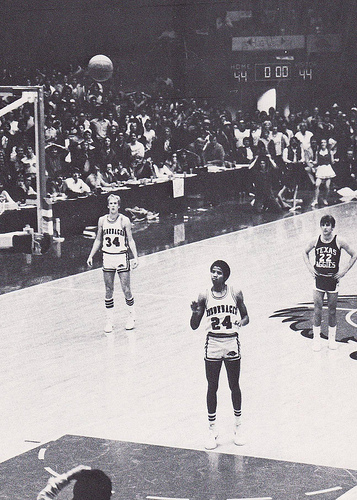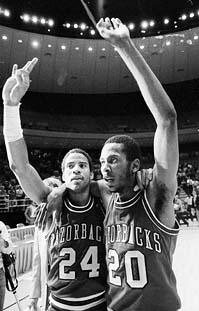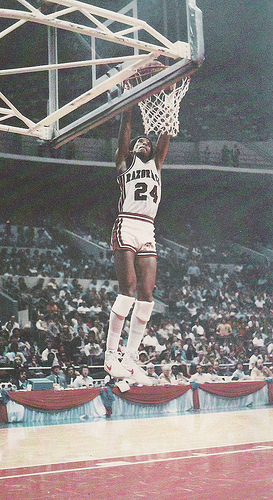
In Part 2 of our Q&A with U.S. Reed, the former Arkansas star discusses how Eddie Sutton - this is amazing in retrospect - was reluctant to sign him. He also talks about the heartbreaking and, in our totally unbiased opinion, terrible traveling call against him in the waning moments of the 1979 NCAA regional final against Indiana State. And he throws in a perhaps surprising opinion on who the best Razorback of all time is. (In case you missed it, here's Part 1. The third and final installment will appear tomorrow.)
Expats: After the halfcourt shot against Louisville, you lost to LSU in the next round. Was it hard for you and the team to put the Louisville game behind you?
Reed: No. Not making excuses, but it was one of those situations - when you're playing against LSU in the Superdome, it's like playing them on their home court. And you're talking about 50,000 people, LSU fans, at the game.
And they were playing with an element of payback because we had beaten them earlier in the year at the Great Alaskan Shootout. So, they had a revenge factor going.
Expats: Our understanding was that you didn't even sign with the Razorbacks until right before your freshman year started and that you were pretty much all set to go to UAPB. Is that right?
Reed: Well, I wanted to go to Arkansas because I wanted to play with people like Sidney Moncrief and Ron Brewer and Marvin Delph. As a junior-high and high-school player, I looked up to those guys and said, "Man, I wouldn't mind playing with those guys."
But, it seemed like Arkansas wasn't sure about my ability. At Pine Bluff High School, I played all of the positions, so they weren't really sure if I could stick to one position.
And then they watched me in the state All-Star Game, and one of the assistant coaches, Pat Foster, convinced Eddie Sutton to give me a scholarship. A couple of other players quit the team. Lawson Pilgrim quit the team, and I took his number (24), so everything kind of worked out.
I think I signed a week before school, a couple of weeks before school.
Expats: Had you signed a letter of intent with UAPB?
Reed: No, I didn't really know where I was going, to be honest with you. They were on the list, but I was kind of leaning towards Louisiana Tech.
Expats: You walked into a team that had a lot of star players and had had a lot of success. Did you immediately feel part of the team, or was it intimidating at first?

Reed: My first visit up there - there was a Pine Bluff family, the McGeorges, that flew me up to Fayetteville on their plane. When I got up there, they actually threw me out on the court with Sidney Moncrief, Ron Brewer and Marvin Delph. It was almost like a tryout.
"Go play with the best players in America, and see how you do!" (Laughs) I was kind of overwhelmed. After I did that, they asked me to walk on, and I told them "no."
After they gave me a scholarship, and I got up there, I would watch from the sidelines when they played pick-up games in the evening. I thought, "I can play with these guys."
I saw what they could or couldn't do and took notes. So, when it was time to play with them, I knew what to do.
But the McGeorges, who flew me up there - their plane crashed on the way to the [1978] Final Four, and they were killed. The same plane that they flew me up to Fayetteville on.
Expats: That's terrible.
Reed: It was shocking.
Expats: We wanted to ask you about the infamous traveling call at the end of the Indiana State game in 1979. Give us your first-hand perspective on what happened.
Reed: That was one of those games - we knew we could win that game. We felt pretty good about it. I had the ball at the end of the game. I was dribbling the ball, and Carl Nicks came up and just stuck his foot out there and tripped me. It was pretty evident.
The crazy thing about it is, I lost control of the ball, so it's anybody's ball then. I went over and picked the ball up - and the ref called traveling.
The big deal wasn't the trip. It was the fact that I lost the ball - it got away from me - and then I went over and picked it up. I didn't dribble or anything, and he called traveling.
So, it was like, "What are you calling?" Everybody was pretty upset.
And then they go down and throw up a left-hand shot with one second left. It goes in, and that's the end of the game.
That probably was the worst loss of my career. We were on the way to the Final Four. There wouldn't have been a Magic-Bird matchup.
Expats: You would have changed college basketball history.
Reed: Yeah. We hadn't lost a game in 14 games. We were on a roll, so it was kind of hard to lose.
Expats: Which season of your four seasons in Fayetteville was the most personally satisfying or most enjoyable for you?
Reed: Probably my freshman year, when we went to the Final Four. That's pretty rare. You're just happy to get there.
Expats: You mentioned your most painful loss. What was your favorite victory?
Reed: Probably the one when we beat UCLA on the way to the Final Four. To beat UCLA during that time, that kind of put us on the map.
Expats: You played against a lot of great players. Who would you say was the best player that you played against?
Reed: As far as an offensive player, I guess you could say Vinnie Johnson. Trying to hold somebody like that - he was pretty remarkable.
Now, the greatest player I ever played with was probably Ron Brewer.
Expats: Oh, really. Better than Sidney, you think?
Reed: Yeah. He could do anything he wanted when he wanted to do it. I would say he's probably the greatest player to play for the Arkansas Razorbacks. That's just my opinion, though.
You're talking about a 6'5" point guard. In one game when we were playing Kansas, he had seven dunks with his left hand. I'd never anything like that before.
I ask people about Kobe Bryant and Lebron James. Everybody always argues about who's the best player. I say, "Well, let me ask you a question, ‘If you had both of them on a team at the same time, who would you rather take a shot at the end of a game?'"
Everybody says, "Well, Kobe Bryant." That tells you something. When we needed a last-second shot, Coach Sutton would go to Ron Brewer. So that should tell you something. When we played Notre Dame in the consolation game, we beat ‘em on a last-second shot - and Ron Brewer shot the shot.
We had Sidney Moncrief, and we had Marvin Delph. We had all those guys. But Ron was the one that Coach looked to to win the game for us.
One practice week Coach Sutton was punishing Ron Brewer for curfew or something. And he put Ron on our team, on the second-string team. We beat the first-string team with him (laughs).
(Tomorrow: U.S. discusses how the '78 squad would fare against the '94 national champions, trying to make the NBA, and the team's reaction to Coach Sutton getting a perm.)
